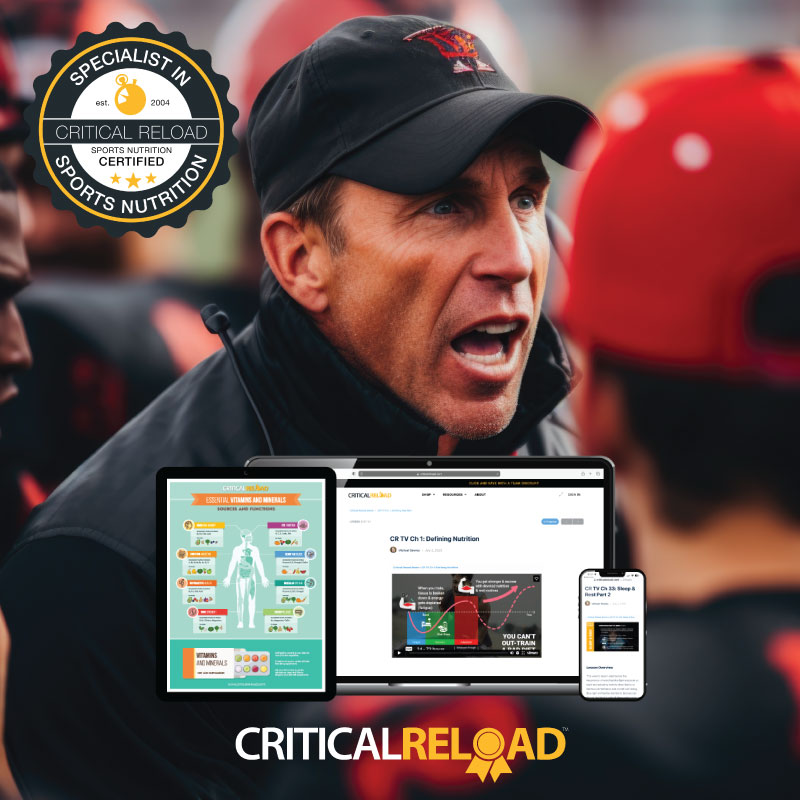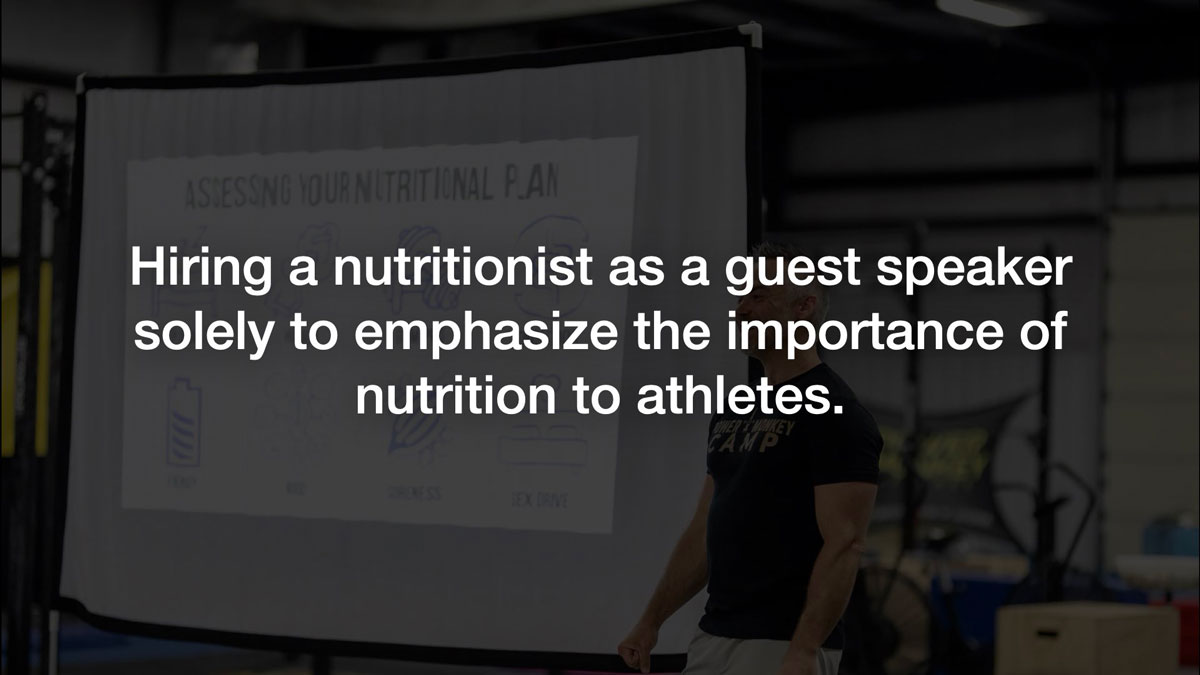As I began writing this series, an additional point came to mind after I had posted “Top 5,” which is now “Top 6” (aka REDUX). You can catch up here if you missed Part 5, where we discussed why including parents in nutrition education is crucial for athletes’ health, performance, and recovery, and discover strategies to bridge this gap and create a supportive home environment.
Hiring a nutritionist as a guest speaker to emphasize the importance of nutrition to athletes while believing that a single instance will make a difference is a common yet flawed approach. While bringing in an expert can be a valuable component of a broader educational strategy, relying solely on a one-time event to change athletes’ behaviors and understanding of nutrition is insufficient for several reasons.
This statement underscores a critical oversight in how nutrition is often approached compared to training. Here’s an expanded explanation:
- Lack of Continuity: A single presentation, no matter how compelling, lacks the continuity needed to instill lasting habits and understanding. Nutrition education, like any form of learning, requires reinforcement over time. Without ongoing education and support, the initial impact of the guest speaker’s message is likely to fade.
- Limited Personalization: Guest speakers typically deliver general advice suitable for a broad audience. However, effective nutrition plans must be personalized to each athlete’s unique needs, goals, and preferences. A one-size-fits-all presentation cannot address individual dietary requirements or answer specific questions that athletes might have.
- Absence of Practical Application: Athletes benefit most from hands-on, practical guidance that helps them apply nutritional concepts daily. A single lecture might provide theoretical knowledge but often lacks the interactive elements necessary for athletes to understand how to implement these ideas in their meal planning, grocery shopping, and eating habits.
- Missed Opportunities for Engagement: Ongoing interaction allows for questions, discussions, and clarifications that deepen understanding. Regular engagement with a nutrition professional or coach creates a supportive environment where athletes feel comfortable seeking advice and sharing their challenges and successes.
- Insufficient Behavior Change: Behavioral change, especially in areas as complex as diet and nutrition, requires consistent effort and reinforcement. Athletes need to be reminded regularly of the importance of nutrition and be provided with strategies to overcome barriers. One-off sessions do not provide the repeated exposure necessary to form new habits.
- Integration with Training Programs: Nutrition should seamlessly integrate with an athlete’s training regimen. This integration ensures that dietary practices support performance goals and recovery needs. Regular consultations with a nutritionist or dietitian allow adjustments based on training cycles, competition schedules, and individual progress.
- Educational Gaps for Parents and Support Systems: Athletes often rely on their parents or guardians for meal preparation and food choices, especially younger athletes. A single presentation does not address the educational needs of these key supporters. Including parents in ongoing nutrition education ensures that the home environment aligns with and reinforces the athlete’s nutritional goals.
- Sustainable Success: To achieve long-term success, athletes must develop a deep and practical understanding of nutrition that evolves with their training and performance needs. This development requires a structured, progressive educational approach, much like how they train for their sport.

The Critical Reload Edge Specialist in Sports Nutrition Certification: A Better Approach
The Critical Reload Edge Specialist in Sports Nutrition Certification provides a comprehensive, structured approach to nutrition education that addresses the limitations of a single guest speaker. This certification program offers:
- Continuous Education: The program provides ongoing learning opportunities that reinforce key nutritional concepts over time, ensuring athletes develop lasting habits and understanding.
- Personalized Plans: Participants learn to tailor nutrition plans to each athlete’s unique needs, goals, and preferences, ensuring effective and individualized guidance.
- Practical Application: The program emphasizes hands-on, practical guidance, helping athletes implement nutritional strategies in their daily lives.
- Engagement and Interaction: Interactive learning sessions, workshops, and personalized consultations foster a supportive environment where athletes can ask questions and receive feedback.
- Behavioral Change: The certification focuses on strategies to promote consistent effort and reinforcement, which is essential for long-term behavioral change.
- Integrated Approach: Nutrition education seamlessly integrates with training programs, ensuring dietary practices align with and support performance goals and recovery needs.
- Parental Involvement: The program includes resources and strategies for involving parents, ensuring the home environment supports the athlete’s nutritional goals.
- Evidence-Based Practices: The certification equips professionals with the latest research and guidelines, ensuring that all nutritional advice is scientifically sound and effective.
By completing the Critical Reload Edge Specialist in Sports Nutrition Certification, coaches and trainers can provide their athletes with the comprehensive, tailored, and scientifically sound nutrition education they need to reach their full potential in performance, health, and recovery. This approach ensures sustainable success and a deeper, more practical understanding of nutrition for athletes and their support systems.
If you are just joining us, start with Part 1 of The Top 5 Coaching Mistakes Undermining Athlete Nutrition to follow the series from the beginning.
